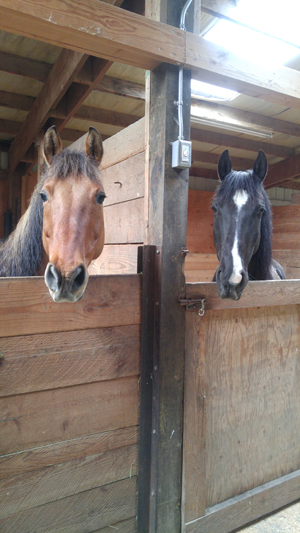Coughs Deserve Close Observation to Determine Cause
by Eleanor Blazer

The sound of a coughing horse can make things come to a halt. Conversation stops, chores are paused, training and riding lessons are interrupted as heads turn to look at the horse. Could the horse just be clearing a tickle, or could the cough be an indication of a serious disease?
Everyone watches to see if the horse will cough again. Activity resumes if there is no more coughing – a slight pause in the daily routine. But if the coughing continues, the audience becomes more attentive.
Coughs are generally divided into two classifications: wet and dry. A wet cough, also known as a productive cough, will be associated with mucus in the respiratory tract. A dry cough may be an early sign the horse is developing a viral infection, and ongoing observation is recommended.
The production of mucus is the body’s way of getting rid of infection or foreign particles. The mucous traps the invaders and removes them from the body. A wet cough can be a sign of a bacterial infection such as streptococcus equi (strangles), or a sign of recurrent airway disease (heaves). These coughs make us do battle against dust, pollen and mold that is present in the feed, bedding, barn, arena, and pasture.
Closer observation will help determine the cause of the coughing. A cough accompanied by a fever, nasal discharge, lethargy, and lack of appetite indicates an infection. The horse should be quarantined and a veterinarian contacted.
In the absence of any infection signs, a journal or some type of documentation should be kept to record the cough episodes; over time a pattern may develop. Be sure to describe the cough, count how many times he coughed, and his activity at the time. If he was eating, note the type and quality of the feed as well as the time of day. Documentation will also help you determine if the cough is changing – getting worse or more frequent.
A horse that coughs repeatedly when exposed to dusty hay, when kept in an enclosed stall, or in the spring and fall when pollen and seeds are present might have recurrent airway obstruction (RAO), commonly known as “heaves”. This is a lifetime ailment and will need to be managed, as it will progressively get worse. Managing the horse with heaves means identifying what triggers the episodes and eliminating the allergen.
Horses that only cough when being ridden may have a “warm-up cough”, an “arena cough” – or both.
A horse with a warm-up cough will cough a few times when exercise is started and then be fine. This horse may have a little natural buildup of mucus behind the larynx and needs to cough a few times to clear his airways.
The arena cough may be confused with the warm-up cough. The arena cough only occurs when riding inside a covered arena; the trigger is the dust and other allergens present in the enclosed area. In time, constant exposure to the dust could lead to heaves.
A cough now and then is normal, but if heads are turning a little too often, it’s time to contact a veterinarian.
Take the online course “Horse Health and Disease” taught by Dr. Jack Sales. Earn certification or work toward a Bachelor of Science degree in Equine Studies. Go to www.horsecoursesonline.com for more information.
Copyright @ 2017
Originally Published May 2017 Issue

Eleanor Blazer was raised training and caring for horses. She learned to ride and care for the horses her family bought and sold. Many of these horses required improved nutrition when they arrived for training. Eleanor’s experience and research has benefited both horses and horse lovers in the field of equine nutrition. An equine nutrition consultant, based in Bulverde, Texas, she keeps busy doing equine nutrition consultations, conducting seminars, and speaking to youth groups about horse care and nutrition. Eleanor is the author of the syndicated column The Way of Horses. She has more than 20 years experience helping and being a mentor to those wanting to know how to provide the very best care and nutrition for our special friend – the horse.

